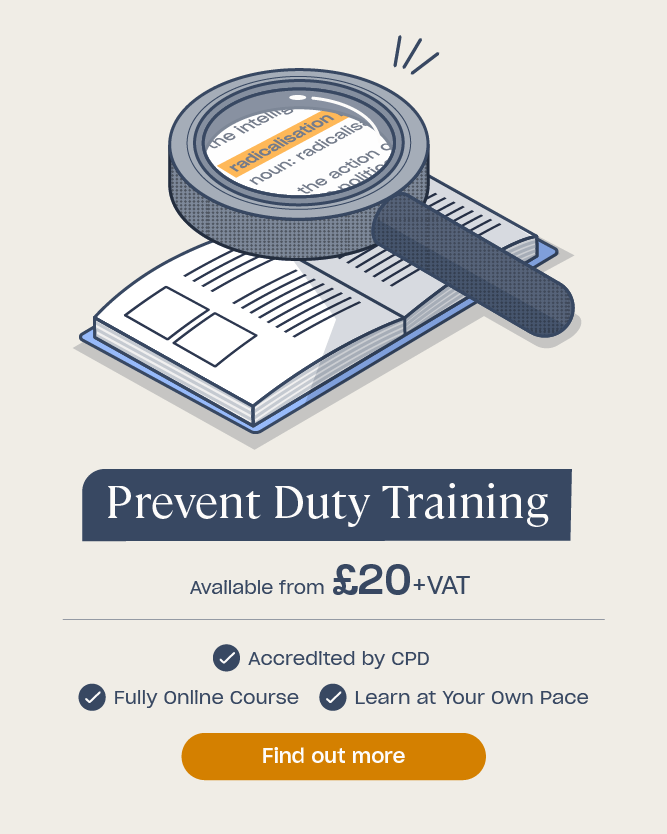Prevent Duty Training: What Do I Need to Know?
Who Needs Prevent Duty Training?
The Prevent duty guidance outlines how frontline staff who engage with the public can contribute to preventing terrorism in England, Wales and Scotland. Specified authorities such as education, health, local authorities, police and criminal justice agencies must understand this guidance and ensure that all staff receive appropriate training to fulfil their duties.
According to the guidance, the objectives of Prevent are to:
- Tackle the ideological causes of terrorism.
- Intervene early to support people who may be susceptible to radicalisation.
- Enable people who have already engaged in terrorism to disengage and rehabilitate.
The exact part that each person has to play in preventing terrorism in their sector will depend greatly on the nature of their role and the specific responsibilities placed on them. For example, those in leadership and management positions are responsible for ensuring their employees receive appropriate Prevent training. They must take a lead role in embedding the guidance in everyday practice.
In summary, all frontline staff should be trained to:
- Understand key terms including ‘radicalisation’, ‘terrorism’ and ‘extremism’.
- Know what constitutes radicalisation and understand how a person may become radicalised.
- Know what the threat and risk of terrorism are in England, Wales and Scotland, including which extremist groups pose the greatest threat.
- Respond to concerns appropriately and know how to make referrals, share information and work collaboratively with other agencies and organisations.
- Understand how the Channel programme works and how their role may support this.
- Know the factors which can make a person more susceptible to radicalisation and how to help such individuals disengage.
- Know how to reduce permissive environments in their sector so that terrorist cannot use their equipment or facilities as a means to spread extremist ideologies.
All specified authorities with a Prevent duty need to ensure they provide appropriate training for staff involved in the implementation of this duty, and be able to show compliance with this requirement.
Want to Learn More?
Our Prevent Duty Training will help you recognise signs that an individual may be susceptible to, or be experiencing, radicalisation or engaging with extremist ideologies. It also covers how to respond to your concerns and how Prevent and the Channel programme work in practice.
Prevent Responsibilities and Training Required by Sector
These lists are indicative of Prevent safeguarding duties. They are not exhaustive and it is important to check with the Prevent safeguarding specialist in your field or organisation to ensure you are aware of all of your safeguarding duties.
Detailed guidance can be found here.
Education
Educators, through their relationships with young people and their frequent interactions with them, are well-placed to recognise when someone may be susceptible to becoming radicalised.
All staff working in the education sector must receive Prevent duty training. They should also be familiar with other safeguarding guidance, including ‘Working together to safeguard children‘ and ‘Keeping children safe in education‘.
Expectations of all education providers include:
- Having a designated senior person who is responsible for the management of Prevent, including ensuring staff receive appropriate training to fulfil their safeguarding duties.
- Working effectively with other agencies and organisations, such as the local authority and police, to ensure risk assessments and referrals are carried out effectively and information is shared appropriately.
- Having policies and procedures in place to allow for the identification of students who may be susceptible to radicalisation.
- Preventing radicalisation and extremist ideologies by embedding British values into the curriculum (schools and further education settings).
- Allowing students to explore controversial topics and discuss them in a safe and well-managed environment.
- Further and Higher education settings must appreciate freedom of speech for students and the role of academic freedom while still discouraging engagement with terrorist ideologies.
- Ensuring there is a robust IT policy which prevents students from accessing extremist material, such as through the use of internet search filters.
- Having policies and procedures in place to ensure external speakers or staff linked to extra curricular activities have been risk assessed and can effectively safeguard the young people they interact with.
- Having robust safeguarding policies and procedures in place to identify students who may be at risk of radicalisation, as well as to assess the risks associated with letting facilities to community and other groups.
- Working with partners and the local authority’s risk assessment to determine the potential risk of individuals being drawn into terrorism in their local area, and completing their own risk assessment.
- Knowing when it is appropriate to make a referral to Channel or children’s services, or carry out early interventions (the DSL is responsible for this).
Healthcare
Those working in healthcare meet a vast array of people, including those who may be susceptible to radicalisation. In building rapport whilst treating patients, they have an opportunity to recognise when someone may be at risk and require support and intervention.
In summary, frontline healthcare workers are expected to:
- Be able to recognise when a person may be at risk of becoming radicalised and know how to intervene or make a referral.
- Work in partnership with other agencies and organisations to safeguard individuals.
- Conduct risk assessments to identify individuals who may be susceptible to radicalisation.
- Understand extremist ideologies and how these can lead to the radicalisation of others.
- Contribute to the Channel process by sharing information where necessary. Detailed guidance on how to comply can be found in the following guidance: Prevent and the Channel process in the NHS: information sharing and governance.
- Know how and when to share information in order to comply with the requirements of Prevent, whilst also taking into account patient confidentiality.
- Ensure any public facilities of IT equipment have processes in place to prevent them from being used to spread extremist ideologies.
In-depth guidance aimed at helping staff to implement and comply with the Prevent Duty can be found in Building Partnerships, Staying Safe.
Criminal Justice Agencies (Prisons and Probation)
Those who work in prisons and probation are not only responsible for protecting the public but also for helping convicted criminals to rehabilitate. They are, therefore, in a unique position to deter individuals from engaging in terrorism again.
Youth offending teams also play a vital role in ensuring young people are protected and drawn away from extremist ideologies and terrorism wherever possible.
In summary, those working in prisons and probation need to be able to:
- Understand the role they have to play in preventing terrorism and engage actively in the training provided.
- Work collaboratively with other agencies and organisations to ensure information is shared and acted upon appropriately.
- Know how to recognise, report and respond to any terrorist risk or threat, including providing early support and intervention to those susceptible to radicalisation.
- Assess and manage risks posed by those convicted of terrorism.
- Cooperate with local authority lead Channel panels.
- Work with the Prison Counter-Terrorism team to continually assess risk.
- Support offenders in rehabilitation and develop strategies to monitor individuals to ensure they do not re-offend (probation).
- Develop policies and procedures to ensure extremist ideologies cannot be shared and spread within prisons or the community.
Police
The role of the police is essential in preventing terrorism. Many roles within the police involve working closely with communities, and this presents an opportunity to recognise when people may be at risk of radicalisation and disrupt any actions linked to terrorism. Particularly, those working in counter-terrorism units are uniquely placed to respond to such issues.
In summary, the police should:
- Work collaboratively to create strong partnerships with other agencies, Prevent leads in the area and colleagues working directly in counter-terrorism.
- Understand the Channel process and be in a position to progress any actions which arise from Channel panels.
- Understand how to assess and respond to terrorism risks within the area.
- Work with local authority Prevent leads to deliver projects within the local community linked to Prevent.
- Understand radicalisation, extremism and terrorism and complete additional training as required by their role.
- Remain up to date with training as required by their role, for example, by reading trends published in the Prevent referral statistics.
- Triage and respond to Channel referrals.
- Develop strategies and interventions to manage individual risks.
- Have strategies in place to ensure their facilities and IT equipment cannot be used to spread extremist ideologies.
- Disrupt and tackle any behaviour linked to terrorism.
- Provide a visible presence at public events to deter terrorists.
Local Authorities
Local Authorities (LAs) have a central and overarching role in protecting the public, preventing crime, and encouraging respectful and tolerant communities.
Local authorities such as county councils and district councils and persons carrying out functions on behalf of local authorities are expected to:
- Coordinate the delivery of Prevent in their area.
- Ensure frontline staff are appropriately trained in accordance with Prevent.
- Promote the importance of Prevent and ensure that risks linked to radicalisation, extremism and terrorism are shared and understood.
- Work collaboratively with other agencies and areas to ensure appropriate delivery and monitoring of Prevent.
- Raise awareness of Prevent amongst communities.
- Support agencies and organisations who work with children to ensure they are compliant with Prevent guidance and that children are being safeguarded effectively.
- Understand the relevant risk of terrorism in the area and be able to risk assess individuals who may be susceptible to radicalisation.
- Work with relevant agencies to create a Prevent partnership plan which reaches the benchmarks outlined in the Prevent duty toolkit.
- Ensure that measures have been put in place to reduce the exploitation of local authority facilities by radicalisers.
- Act as chair as required on Channel Panels.

Further Resources:
- Practical Tips for Managing Controversial Topics in the Classroom
- Fundamental British Values Lesson Plans for Teachers
- Prevent Duty Quiz
- How to Tackle Incel Culture in Schools
- Work Experience Guidance for Schools: Do I Need a Young Person’s Risk Assessment?











